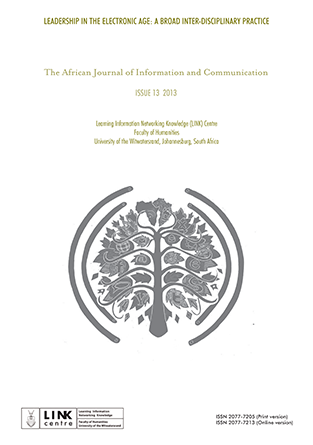On Rational Choice, Risk and Utility in Mobile Banking
Keywords:
mobile banking, privacy, risk, utility, rational choice theoryAbstract
The diffusion of mobile banking technology offers an opportunity for analysis of the risk associated with the protection of information of banking clientele. There is emerging discourse with regard to clientele awareness of privacy issues. This article conceptualises banking clientele awareness of specific issues such as risk, security and information privacy policies. The key concern is the impact such awareness has on subscribers choosing to continue their use of mobile banking services. The article attempts to explain the utility/risk trade-off and how this affects the clients' willingness to continue subscribing to mobile banking services, using quantitative analysis and rational choice theory (RCT). Purposeful sampling targeted South African bank account-holders. Empirical results show that consumer willingness to continue to use mobile banking services is largely driven by the perceived utility of the service, while privacy risk is not a significant deterrent. This is an important finding in the context of banks encouraging consumers to use mobile banking systems, for the banks to achieve retail growth. This creates a greater responsibility for banks to manage consumer risk. The findings may be more broadly pertinent in the SADC region and on the African continent, where telecoms firms engaged in mobile banking services must also attend to issues of consumer risk; and where R&D investment in the field of information security is highly desirable.
References
Adler, E. & Clark, R. (2008). How it’s done: An invitation to social research, 3rd edition. Thomson, California.
Agarwal, B. (2005). Programmed statistics: Question-answers, 3rd edition. New Age International, New Delhi.
Ayo C. & Ukpere W. (2010). Design of a secure unified e-payment system in Nigeria: A case study. African Journal of Business Management 4(9) pp. 1753-1760. https://doi.org/10.5897/AJBM.9000322
Barman, S. (2002). Writing Information Security Policies. New Riders, Indiana.
Bridge G. (2009). Rational choice theory and rational choice Marxism, International Encyclopedia of Human Geography, pp. 100-106.
Cate, F. (1997). Privacy in the information age. The Brookings Institution, Washington.
CGAP (2010). Update on Regulation of Branchless Banking in Kenya. CGAP.org. Retrieved 16 November 2013 from http://www.cgap.org/sites/default/files/CGAP-Regulation-of-Branchless-Banking-in-Kenya-Jan-2010.pdf.
Chege, F. & Wepukhulu, J. (2013). The effect of mobile money transfer on working capital management: A case of debt collection at NAWASSCO. Research Journal of Finance and Accounting, 4(14) pp 66-71.
De Vaus, D. (2002). Analyzing social science data: 50 key problems in data analysis. Sage, London.
Elliot, G. & Phillips, N. (2004). Mobile commerce and wireless computing systems. Pearson, Harlow.
Essegbey, G. & Frempong G. (2011). Creating space for innovation: The case of mobile telephony in MSEs in Ghana, Technovation, 31 pp. 679-688. https://doi.org/10.1016/j.technovation.2011.08.003
Foster, J. (1998). Data analysis using SPSS for Windows: A beginner’s guide. Sage, London.
Giordano, S. (2010). Applying information security and privacy principles to governance, risk management and compliance, SANS Institute InfoSec Reading Room, pp.1-32.
Gregory, R. (1996). Psychological testing: History, principles and applications, 2nd edition. Allyn & Bacon, Boston.
Huang, S., Shen, W., Yen, D. & Chou, L. (2011). IT governance: Objectives and assurances in Internet banking, Advances in Accounting, incorporating Advances in International Accounting, 27 pp.406-414. https://doi.org/10.1016/j.adiac.2011.08.004
Hu, W., Lee, C. & Kou, W. (2005). Advances in security and payment methods for mobile commerce. Idea Group Publishing, Hershey.
Husted, N., Saidi, H. & Gehani, A. (2011). Smartphone security limitations: Conflicting traditions, Proceedings of the 2011 Workshop on governance of technology, information and policies, ACM, New York.
Korb, B. (2013). Implementation of POPI Act means companies must secure their information. IT Governance and Risk Management, ITWeb, Retrieved 10 October 2013 from http://www.itweb.co.za/index.php?option=com_content&view=article&id=63461.
Legris, P., Ingham, J. & Collerette, P. (2003). Why do people use information technology? A critical review of the technology acceptance model. Information & Management, 40 pp. 191-204. https://doi.org/10.1016/S0378-7206(01)00143-4
McKnight, D., Choudhury V. & Kacmar, C. (2002). Developing and validating trust measures for e-commerce: An integrative typology, Information Systems Research, 13(3) pp. 334-359. https://doi.org/10.1287/isre.13.3.334.81
Miljkovic, D. (2005). Rational choice and irrational individuals or simply an irrational theory: A critical review of the hypothesis of perfect rationality. Journal of Socio-Economics, 34(5) pp. 621-634. https://doi.org/10.1016/j.socec.2005.07.003
Mishra, V. & Bisht, S. (2013). Mobile banking in a developing economy: A customer-centric model for policy formulation. Telecommunications Policy, 37(6-7) pp. 503-514. https://doi.org/10.1016/j.telpol.2012.10.004
Pai, F. & Huang, K. (2011). Applying the technology acceptance model to the introduction of healthcare information systems. Technological Forecasting & Social Change, 78 pp. 650-660.
Park, S. (2009). An analysis of the technology acceptance model in understanding university students’ behavioral intention to use e-learning. Educational Technology & Society,
12(3) pp. 150-162.
Shaw, P. (2001). e-Business privacy and trust: Planning and management strategies. John Wiley & Sons, New York.
Shen, Y., Huang C., Chu, C. & Hsu, C. (2010). A benefit-cost perspective of the consumer adoption of the mobile banking system. Behavior & Information Technology, 29(5) pp. 497-511. https://doi.org/10.1080/01449291003686070
Solovo, D., Rotenberg, M. & Schwartz, P. (2006). Privacy, information, and technology. Aspen Publishers, New York.
SouthAfrica.info (2012) South Africa banks go mobile. SouthAfrica.info, retrieved 10 Oct 2013 from http://www.southafrica.info/business/trends/newbusiness/mobile-banking-050412.htm.
Toyama, K. (2009). Mobile banking adoption and usage by low-literate, low income users in the developing world. Journal of Internalization, Design and Global Development, pp. 485-494.
Turner, M., Kitchenham, B., Brereton, P., Charters, S. & Budgen, D. (2010). Does the technology acceptance model predict actual use? A systematic literature review. Information and Software Technology, 52 pp. 463-479. https://doi.org/10.1016/j.infsof.2009.11.005
Venkatesh, V. (2000). Determinants of perceived ease of use: Integration control, intrinsic motivation, and emotion into the technology acceptance model. Information Systems Research, 11(4) pp. 342-365. https://doi.org/10.1287/isre.11.4.342.11872
Yang, B. & Lester, D. (2008). Reflections on rational choice: The existence of systematic irrationality. The Journal of Socio-Economics, 37(3) pp. 1218-1233. https://doi.org/10.1016/j.socec.2006.12.071
Yoo, Y., Lee, J. & Rowley, C. (2008). Trends in mobile technology and business in the Asia-Pacific region. Chandos Publishing, Oxford.
Downloads
Published
Issue
Section
License
Copyright (c) 2013 https://creativecommons.org/licenses/by/4.0

This work is licensed under a Creative Commons Attribution 4.0 International License.
How to Cite
- Abstract 346
- pdf 223


.png)